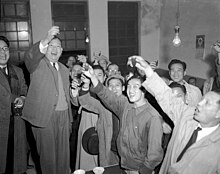Tangwai movement
You can help expand this article with text translated from the corresponding article in Chinese. (January 2016) Click [show] for important translation instructions.
|
| Tangwai movement | |||||||||||||||
|---|---|---|---|---|---|---|---|---|---|---|---|---|---|---|---|
| Traditional Chinese | 黨外 | ||||||||||||||
| Simplified Chinese | 党外 | ||||||||||||||
| Literal meaning | Outside the party | ||||||||||||||
| |||||||||||||||
 |
|---|
|
|

The Tangwai movement, or simply Tangwai (Chinese: 黨外; pinyin: Dǎngwài), was a political movement in the Republic of China (Taiwan) in the mid-1970s and early 1980s. Although the ruling Kuomintang (KMT) had allowed contested elections for a small number of seats in Legislative Yuan, opposition parties were still forbidden. As a result, many opponents of the KMT, officially classified as independents, ran and were elected as members "outside the party."
Because the majority of seats in the Legislative Yuan were held by delegates purportedly representing constituencies in mainland China, who were elected in 1947 and appointed thereafter (because the "electorate" in mainland China was unable to cast votes in an election in the Taiwan Area), pending the promised retaking of mainland China, the Tangwai movement had no possibility of gaining power. They were, however, able to use the legislature as a forum for debating the ruling KMT.
Members of the Tangwai movement formed the Democratic Progressive Party (DPP) in 1986. Although still illegal, the KMT did not take action against the DPP and the party was legalized in 1991. Many current politicians in Taiwan, most notably former President Chen Shui-bian and Vice President Annette Lu, were active in the Tangwai movement.[1]
Tangwai members, including Shih Ming-teh and Lin Yi-hsiung, were often harassed or imprisoned by the KMT government, especially in the wake of the 1979 Kaohsiung Incident.

